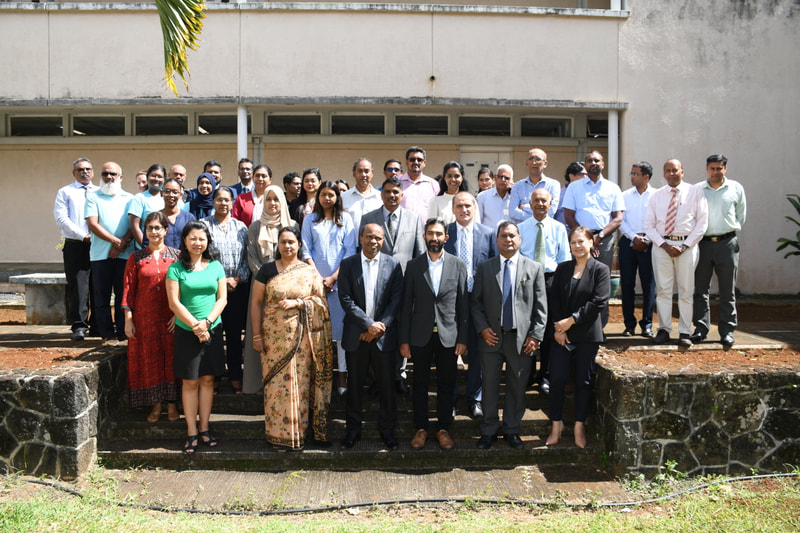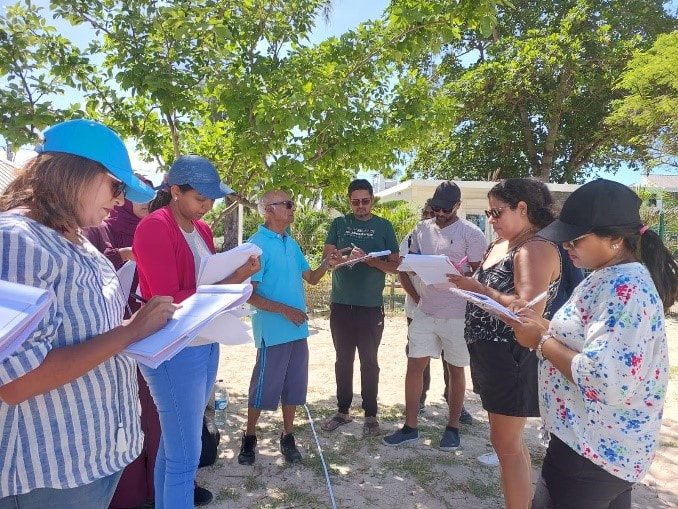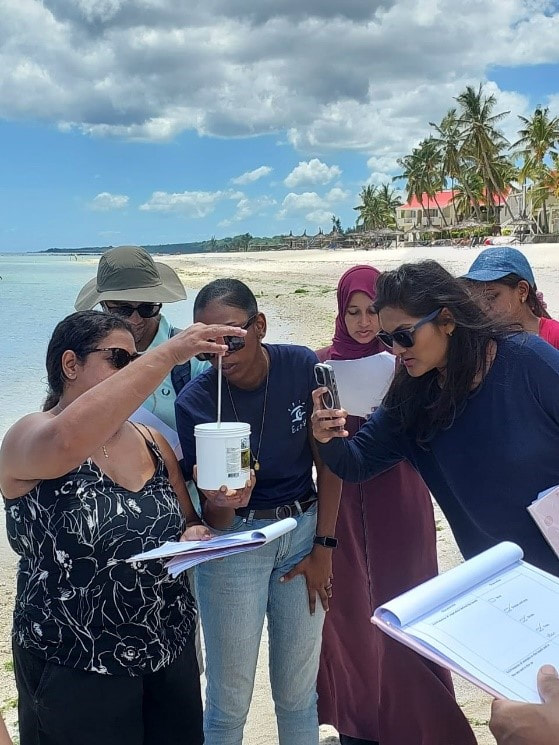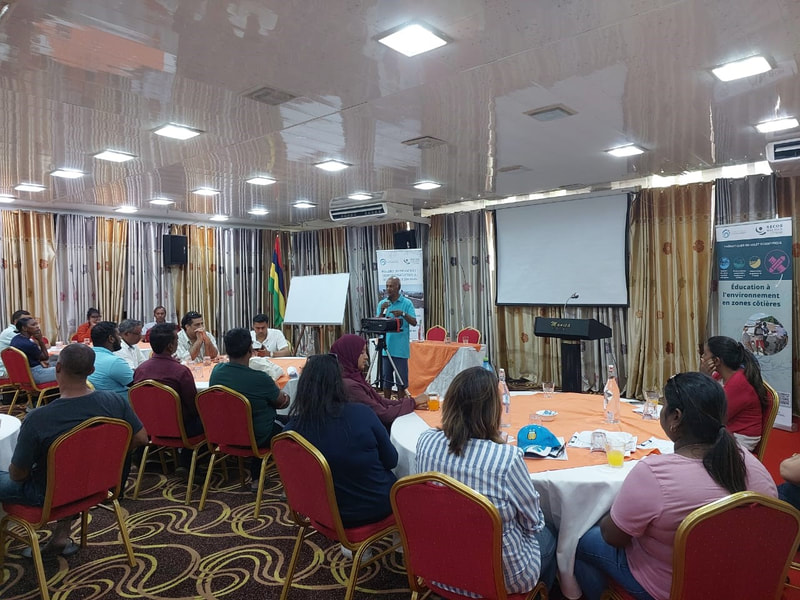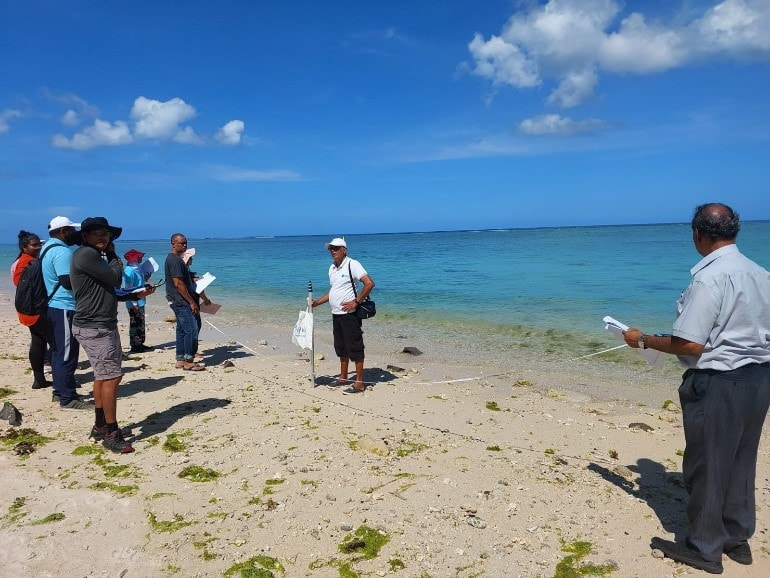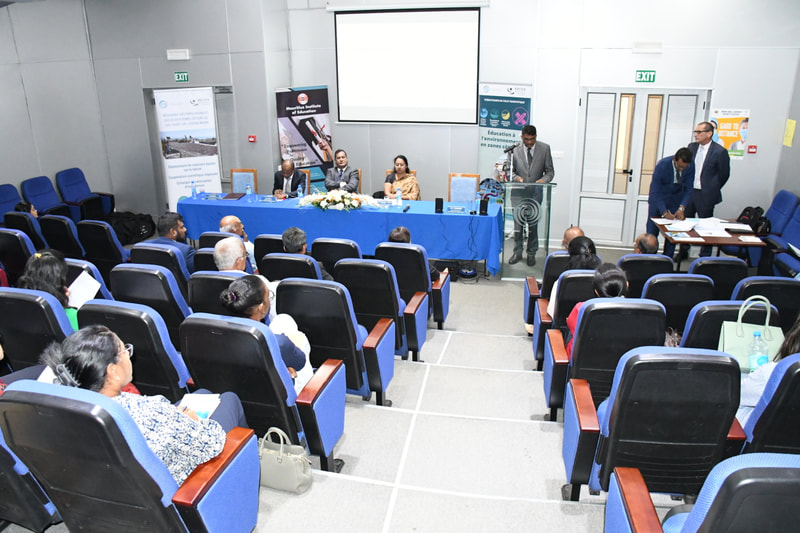National workshop to reactivate Sandwatch in Mauritius 2024
28 February, Mauritius Institute of Education, Reduit and 29 February, Flic en Flac Public beach
A 2-day national “Train the Trainers” workshop was organized on the 28 and 29 February 2024 within the framework of the “Coastal populations and ecosystems resilience in the South-West Indian Ocean (RECOS)” project of the Indian Ocean Commission (IOC), in collaboration with the Ministry of Education, Tertiary Education, Science and Technology (MoETS&T) and Mauritius Institute of Education (MIE). The main aim was to empower 14 school educators from 7 schools and 3 NGOs to participate in the implementation of UNESCO Sandwatch programme in the 7 schools in 2024 and beyond. RECOS is supported by the “Agence française de développement” (AFD) and the “Fonds français pour l’environnement mondial (FFEM)” through IOC, the overall objective of which is to strengthen the resilience of coastal populations to the effects of climate change by restoring the services provided by coastal ecosystems. Sandwatch is part of the scientific section of RECOS with focus on activities relating to “Coastal Observation and Management” priority thematic areas. The training workshop is a follow-up to the first RECOS Sandwatch Regional Workshop (Mauritius, 21-24 February 2023), which was attended by the 4 IOC countries – Comoros, Madagascar, Mauritius and Seychelles – to prepare a plan to reinvigorate Sandwatch programme in the IOC region.
A 2-day national “Train the Trainers” workshop was organized on the 28 and 29 February 2024 within the framework of the “Coastal populations and ecosystems resilience in the South-West Indian Ocean (RECOS)” project of the Indian Ocean Commission (IOC), in collaboration with the Ministry of Education, Tertiary Education, Science and Technology (MoETS&T) and Mauritius Institute of Education (MIE). The main aim was to empower 14 school educators from 7 schools and 3 NGOs to participate in the implementation of UNESCO Sandwatch programme in the 7 schools in 2024 and beyond. RECOS is supported by the “Agence française de développement” (AFD) and the “Fonds français pour l’environnement mondial (FFEM)” through IOC, the overall objective of which is to strengthen the resilience of coastal populations to the effects of climate change by restoring the services provided by coastal ecosystems. Sandwatch is part of the scientific section of RECOS with focus on activities relating to “Coastal Observation and Management” priority thematic areas. The training workshop is a follow-up to the first RECOS Sandwatch Regional Workshop (Mauritius, 21-24 February 2023), which was attended by the 4 IOC countries – Comoros, Madagascar, Mauritius and Seychelles – to prepare a plan to reinvigorate Sandwatch programme in the IOC region.
Sandwatch has been implemented in Mauritius by the NGO Association pour le Développement Durable (ADD) from 2018 to March 2020 in 4 State Secondary schools, scattered around Mauritius. Nearly 200 students benefitted from it. However, on account of the first lockdown on 19 March 2020 due to the COVID-19 pandemic, it has since been held in abeyance. An attempt was made to resume it on 09 June 2023 at the Fatima College when 30 students and 3 Educators met at Anse La Raie beach in the north to collect data on a few beach parameters. It was, however, only a one-time activity.
2. The National workshop
2.1 Opening ceremony
The opening ceremony took place at the Mauritius Institute of Education (MIE), Reduit, in the morning of 28 February 2024. After the welcome speeches of (i) Mr Christophe Legrand, RECOS Regional Coordinator, and (ii) Prof. Ravhee Bholah, MIE, the National Referent on Environmental Education, RECOS Project, Mr. Anfani Msoili, IOC Chargé de mission “Transition écologique et énergétique, tourisme et migrations”, Dr. Hemant Bessoondyal, MIE Director and Mrs Shalini Mahadowa-Reechaye, Acting Director, Curriculum Development & Evaluation, MoETS&T, then addressed the gathering.
Sandwatch kits were then distributed by the eminent personalities to the 7 schools, 3 NGOs and MIE.
2.2 Presentations on Sandwatch
Prof Bholah initially made 2 presentations to set the scene. He stressed the relevance of UNESCO Sandwatch programme within the context of Climate Change Education for Sustainable Development (CCESD), in enhancing knowledge on the impacts of climate change on beach ecosystems and in addressing problems facing beaches. He underscored the role of Educators in promoting Sandwatch in their respective schools. This will help inspire students to become eco-citizens and participate more actively in the wise management of the coastal environment.
Mr Ragoonaden, from the NGO Association pour le Développement Durable (ADD) made 4 presentations. He first introduced Sandwatch, highlighting that “Sandwatch is a vibrant, practical and hands-on outreach programme, which links classroom activities to real-life issues”. The concept of Sandwatch programme can be linked to the school curriculum. It addresses through a wide range of subjects including Mathematics, Science, Social studies and the creative arts. It stimulates and encourages practitioners to take action by becoming involved in caring for their environment, and in understanding and influencing local government related policies and actions.
He went on explaining the 4-steps methodological approach, namely Monitoirng, Analysing, Sharing and Taking Action known by the acronym MAST in implementing Sandwatch. Much attention was dedicated to the Beach Records Platform, which is an open-access tool, launched in 2023, to enable practitioners record and share (i) general information about their beach (ii) beach data based on the measurement protocols used in the Sandwatch methodology, and (iii) actions taken to enhance the beach environment and adapt to climate change.
2. The National workshop
2.1 Opening ceremony
The opening ceremony took place at the Mauritius Institute of Education (MIE), Reduit, in the morning of 28 February 2024. After the welcome speeches of (i) Mr Christophe Legrand, RECOS Regional Coordinator, and (ii) Prof. Ravhee Bholah, MIE, the National Referent on Environmental Education, RECOS Project, Mr. Anfani Msoili, IOC Chargé de mission “Transition écologique et énergétique, tourisme et migrations”, Dr. Hemant Bessoondyal, MIE Director and Mrs Shalini Mahadowa-Reechaye, Acting Director, Curriculum Development & Evaluation, MoETS&T, then addressed the gathering.
Sandwatch kits were then distributed by the eminent personalities to the 7 schools, 3 NGOs and MIE.
2.2 Presentations on Sandwatch
Prof Bholah initially made 2 presentations to set the scene. He stressed the relevance of UNESCO Sandwatch programme within the context of Climate Change Education for Sustainable Development (CCESD), in enhancing knowledge on the impacts of climate change on beach ecosystems and in addressing problems facing beaches. He underscored the role of Educators in promoting Sandwatch in their respective schools. This will help inspire students to become eco-citizens and participate more actively in the wise management of the coastal environment.
Mr Ragoonaden, from the NGO Association pour le Développement Durable (ADD) made 4 presentations. He first introduced Sandwatch, highlighting that “Sandwatch is a vibrant, practical and hands-on outreach programme, which links classroom activities to real-life issues”. The concept of Sandwatch programme can be linked to the school curriculum. It addresses through a wide range of subjects including Mathematics, Science, Social studies and the creative arts. It stimulates and encourages practitioners to take action by becoming involved in caring for their environment, and in understanding and influencing local government related policies and actions.
He went on explaining the 4-steps methodological approach, namely Monitoirng, Analysing, Sharing and Taking Action known by the acronym MAST in implementing Sandwatch. Much attention was dedicated to the Beach Records Platform, which is an open-access tool, launched in 2023, to enable practitioners record and share (i) general information about their beach (ii) beach data based on the measurement protocols used in the Sandwatch methodology, and (iii) actions taken to enhance the beach environment and adapt to climate change.
2.3 Measurement and observations of beach parameters
The collection of beach data and information was conducted on the second day at the popular Flic en Flac public beach with the support of the ADD team, comprising Messrs Sachooda Ragoonaden, Palmesh Ramen and Ved Torul. Participants were trained how to collect data at a first site on: beach width from a reference object to the High Water Mark, waves (height, direction and period), longshore current (direction and speed), sand characteristics (colour, size and shape), litter (number of pieces and weight) and plants and animals (on the beach and sea) within 2 m on either side of a transect line, and water quality characteristics. Participants were then given the opportunity to acquire direct hands-on practical experience by collecting the same series of data at a second site under supervision by “learning by doing”.
In the afternoon, all participants gathered at a nearby hotel to populate the Beach Records platform with the data collected and photos taken on the beach, following interactive discussion and group activities. They completed Parts 1 and 2 which were submitted to the Sandwatch Foundation.
During the closing ceremony, Mrs Adèle DE TOMA of RECOS, Prof. Ravhee Bholah of MIE and Mr Hemant Goolaub of the Ministry of Education, ETS &T thanked all participants for their active involvement and great dedication shown throughout the Sandwatch training activities. He also wished them good luck in the course of the school implementation phase.
After 2 days, it was quite exciting to see the link on the Mauritius page of the Sandwatch Foundation website to view the converted data and photos uploaded by the Educators.
3. Follow-up action
During the 2-day workshop, the 14 Educators and 3 NGOs have acquired adequate knowledge and practical skills in the MAST approach methodology and in how to use the Beach Records platform for archiving beach data on a permanent basis. The participants showed high levels of enthusiasm and commitment. They are now well prepared and equipped with the necessary tools to introduce Sandwatch in their respective schools to train students contribute to effective beach monitoring activities and sustainable coastal management.
The NGO ADD has been tasked to provide, initially, some assistance in the implementation process to 2 schools in the West of Mauritius, NGO Reef Conservation to 3 schools in the North and NGO Eco-Sud to 2 schools in the South East. Sandwatch activities have been planned for the first and second terms of the 2024 school calendar with the financial support of RECOS. It is expected that, in the following years, more educators would be trained and Sandwatch extended to other secondary and primary schools around the island There are ongoing discussions on potential partnerships and sponsorships to expand Sandwatch to other schools and institutions with the aim of ensuring project’s sustainability in the future.
By Sachooda Ragoonaden, Mrs Adèle DE TOMA, Prof. Ravhee Bholah
The collection of beach data and information was conducted on the second day at the popular Flic en Flac public beach with the support of the ADD team, comprising Messrs Sachooda Ragoonaden, Palmesh Ramen and Ved Torul. Participants were trained how to collect data at a first site on: beach width from a reference object to the High Water Mark, waves (height, direction and period), longshore current (direction and speed), sand characteristics (colour, size and shape), litter (number of pieces and weight) and plants and animals (on the beach and sea) within 2 m on either side of a transect line, and water quality characteristics. Participants were then given the opportunity to acquire direct hands-on practical experience by collecting the same series of data at a second site under supervision by “learning by doing”.
In the afternoon, all participants gathered at a nearby hotel to populate the Beach Records platform with the data collected and photos taken on the beach, following interactive discussion and group activities. They completed Parts 1 and 2 which were submitted to the Sandwatch Foundation.
During the closing ceremony, Mrs Adèle DE TOMA of RECOS, Prof. Ravhee Bholah of MIE and Mr Hemant Goolaub of the Ministry of Education, ETS &T thanked all participants for their active involvement and great dedication shown throughout the Sandwatch training activities. He also wished them good luck in the course of the school implementation phase.
After 2 days, it was quite exciting to see the link on the Mauritius page of the Sandwatch Foundation website to view the converted data and photos uploaded by the Educators.
3. Follow-up action
During the 2-day workshop, the 14 Educators and 3 NGOs have acquired adequate knowledge and practical skills in the MAST approach methodology and in how to use the Beach Records platform for archiving beach data on a permanent basis. The participants showed high levels of enthusiasm and commitment. They are now well prepared and equipped with the necessary tools to introduce Sandwatch in their respective schools to train students contribute to effective beach monitoring activities and sustainable coastal management.
The NGO ADD has been tasked to provide, initially, some assistance in the implementation process to 2 schools in the West of Mauritius, NGO Reef Conservation to 3 schools in the North and NGO Eco-Sud to 2 schools in the South East. Sandwatch activities have been planned for the first and second terms of the 2024 school calendar with the financial support of RECOS. It is expected that, in the following years, more educators would be trained and Sandwatch extended to other secondary and primary schools around the island There are ongoing discussions on potential partnerships and sponsorships to expand Sandwatch to other schools and institutions with the aim of ensuring project’s sustainability in the future.
By Sachooda Ragoonaden, Mrs Adèle DE TOMA, Prof. Ravhee Bholah
